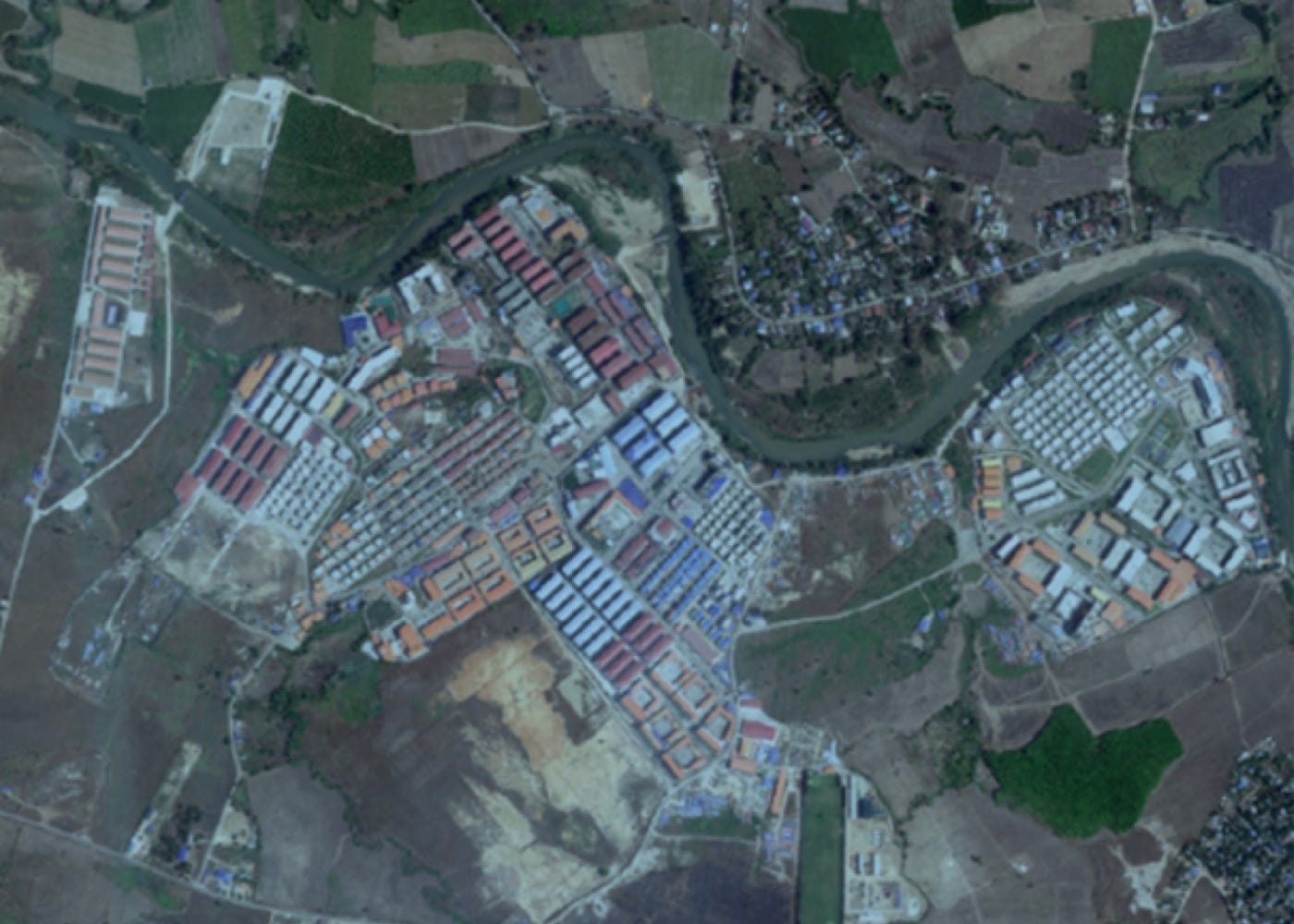Killer Whales + KK Park PR stunt + AWS outage
Scamurai weekly newsletter #14. Oct. 25, 2025.
- Scamurai -
Weekly newsletter #14. Oct. 24, 2025.
// Headlines
At first, a raid on Myanmar’s notorious scam hub KK Park sounded like good news. Reported by state-run The Global New Light Times on Oct. 20, the government raided the south Myawaddy site, seizing 20 Starlink sets. Soldiers occupied 200 buildings in the park and discovered over 2,000 workers. The report added that “no official documents have been found to verify government permits, land ownership rights, or hotel and tourism construction approvals.” A spokesperson for the Myanmar military then accused the Karen National Union, an armed ethnic group in the region, of involvement in the running of KK Park, which the KNU has previously denied. However, the extent to which the raid has been effective is debatable, and some have dismissed it as little more than a PR stunt ahead of the ASEAN Summit in Kuala Lumpur next week. In particular, The Irrawaddy reported that nobody was arrested and that the soldiers raiding the compound gave local officials colluding with the park warning of the actions ahead of time.
Across the border, the Thai government is also contending with accusations of links to scams. Deputy Finance Minister Vorapak Tanyawong resigned this week following claims by Project Brazen he is linked to regional scam and money laundering networks. It comes after a report that South Korea had also connected seven Thai politicians to scam operations, which the Thai government has denied. Last week, a local politician also claimed he had been offered bribes by scam networks, but has not provided more details publicly.
Finally, this week saw a major outage at Amazon Web Services (AWS) which demonstrated just how vulnerable online services are to single points of failure from third parties. The cloud computing service’s issues left multiple websites and services shut down, including government services here in the UK, and companies like Reddit and Snapchat. More amusingly, it showed the lie to crypto’s promise of “decentralisation”. It affected numerous crypto services too, including the metadata of NFTs, meaning their images disappeared. It also resulted in people having trouble using devices in their smart homes. Perhaps it’s time for the world to do some soul-searching about how reliant we are on very delicate infrastructure. But we probably won’t.
// Killer Whales is everything that’s wrong with crypto
By Callan Quinn
The second season of Killer Whales, a crypto-themed Shark Tank knock-off, debuted a few weeks ago. Few people noticed.
Set in what looks like an abandoned garage, the concept follows shows like Shark Tank or Dragon’s Den, with five supposed crypto titans (but mostly influencers) sitting in judgment as startup founders pitch their blockchain dreams. The judges, or “whales”, then choose to “sink” or “swim” a project. Those with a majority of “swim votes” — three out of five — are considered to have passed.
It’s not really clear what the prize is. It’s always carefully phrased as “$1.5 million in prizes”, without explaining what they are, only that it includes some sort of “accelerator package from the legendary CoinMarketCap”. Yay.
The whales’ intros are equally absurd. Crypto Banter and Onchain Capital CEO Ran Neu-Ner’s intro details that he “lost over a hundred million in a day during the infamous 2022 crypto collapse”, before we are told that even if we don’t like influencer Mario Nawful, we need to “respect his grind” (we don’t). It’s almost as bad as crypto influencer Wendy O’s season one intro, which was “I’m a woman”, with no reference to what she actually does or who she is.
Somewhere amongst this befuddled jargon-laced word salad is the makings of a very lethal drinking game. Shots should be handed out for mentions of “onboarding the next billion people”, “interoperability”, “the community”, “power to the people”, “governance model” and every other trite, meaningless crypto slogan that issues forth from the mouths of both the judges and judged.
But the most bizarre thing about it is that, on occasion, the whales do ask the right questions and contestants flounder. There are awkward moments when people are forced to admit their projects have few users, no utility and that the people presenting the pitch have no ability to grasp basic financials. What is weird about this though is that the whales hear all this and “swim” the projects anyway.
Perhaps it’s because there’s no money on the table.
Get this newsletter delivered fresh and ironed to your email each week, with the latest news on scams, fraud and tech, as well as Scamurai’s latest investigations — all in one place!
// Scam Factory
Indian authorities seized $272 million from unnamed individuals they say defrauded investors by falsely promising high returns via the OctaFX forex trading platform. Their actions follow the arrest of OctaFX’s Russian founder, Pavel Prozorov, in Spain. India’ Directorate of Enforcement said on Oct. 17 that OctaFX had been operating since at least July 2022 in India, while its probe revealed an extensive international network spanning from Spain to Singapore. Among its tactics for duping investors, OctaFX manipulated trading operations by using falsified candlestick charts and deliberate slippage to ensure investor losses.
ASEAN may finally be getting to grips with the fact that it needs to do more to combat the sprawling industrialised scam empires embedding themselves into the region. The Malaysian International Humanitarian Organisation, a Malaysian NGO, is urging the government there to take a tougher stance on scam centres in Cambodia, particularly as Malaysia is the current ASEAN chair. Laos has also lauded its commitment to fighting cybercrime this week with its plans to sign the United Nations Convention on Countering Cybercrime in Hanoi this weekend. But rather than just pointing fingers abroad, both Malaysia and Laos might want to take a look at the scam centres being operated within their own borders too. On the ground in Kuala Lumpur, Scamurai has heard multiple reports of condos rented out and used as scam centres by Chinese outfits, while compounds in Laos, including in the Golden Triangle Special Economic Zone, operate with little interference.
Following weeks of meltdown in South Korea about Korean involvement in scam compounds in Cambodia – including a dead student, the arrest of dozens of Korean scam centre workers, and what appears to be a Korean-run scamming operation – Korea’s National Police Agency is joining an international crackdown called “Breaking Chains” to try and dismantle scam syndicates in Cambodia and further afield. It joins Cambodia, Laos, Singapore, the Philippines, Thailand, the United States, the United Arab Emirates, and Qatar in the effort.
Lauren Dreyer, VP of Starlink Business Operations at SpaceX, says the company has identified and disabled over 2,500 Starlink kits in the vicinity of suspected “scam centres” in Myanmar. “We are committed to ensuring the service remains a force for good and sustains trust worldwide: both connecting the unconnected and detecting and preventing misuse by bad actors,” she said on X on Oct. 22.
// Hacks & dark markets
Europol revealed this week that it had disrupted a cybercrime-as-a-service network in Latvia earlier this month. Five suspected cybercriminals were arrested, while law enforcement took down five servers and seized 1,200 SIM box devices alongside 40,000 active SIM cards. Investigators have attributed to the criminal network more than 1,700 individual cyber fraud cases in Austria with total losses of EUR4.5m, and 1,500 in Latvia, worth EUR420,000.
// Crypto circus
Cryptomus has been fined $177,000 CAD by Canadian regulator FINTRAC for Proceeds of Crime (Money Laundering) and Terrorist Financing Act violations, the regulator said on Oct. 22. Among the failures was that the firm “failed to submit suspicious transaction reports for transactions where there were reasonable grounds to suspect that they were related to the laundering of proceeds connected to trafficking in child sexual abuse material, fraud, ransomware payments and sanctions evasion.”
Mr Beast, real name Jimmy Donaldson, looks set to be opening some sort of financial company after filing the trademark for “MrBeast Financial”. The Youtuber has previously made forays into multiple businesses, including chocolates and snacks.
Investors in Melania Trump’s memecoin have filed a lawsuit against the creators, accusing them of running a pump and dump. Melania herself is not named in the suit. The coins were released on Jan. 19, prior to Trump’s inauguration and the launch of his own memecoin. $Melania’s price hit a peak of $13.05 but has since crashed 99.2% to its current value of $0.099.
// ScamurAI
Reddit’s spree of lawsuits against AI companies continued this week with the filing of a suit against Perplexity, SerApi, OxyLabs, and AWMProxy for scraping its data without permission to train their AI models. It follows a similar suit by Reddit against Anthropic. The social media company has cut deals with OpenAI and Google to license its data. Reddit is a very popular source of information for many AI models. Perish the thought.
Pinterest is trying to take a harder line on the AI slop that has made its site all but unusable of late. Last week it said it would give users more options to remove AI content. The tuner is available on Windows and Desktop, with plans to roll it out to iOS in the next few weeks. Next, Scamurai humbly suggests Pinterest do something about the fact that every third pin is an ad.
// Big tech & big crypto
Trump’s home renovation project at the White House has a very unsurprising list of donors financing the plans to create a new bigly ballroom by demolishing the east wing. The project, costing $300 million, will include donations from many of the usual suspects: Amazon, Apple, Coinbase, Comcast, Google, HP, Lockheed Martin, Meta, Microsoft, Palantir, Ripple, T-Mobile, Tether America, and the tweedle twins Winklevii. See the full list here.
Not on the list was Changpeng “CZ” Zhao, the former CEO of Binance, who has finally secured his much-wanted pardon from Trump. He spent four months in prison last year for enabling AML violations at the crypto exchange, for which Binance was fined $4.3 billion. One wonders whether next up will be Sam Bankman-Fried or Elizabeth Holmes, both of whom are edging for pardons and both of whose X accounts have become weirdly active over the past few weeks (Scamurai assumes they have been hacked and memecoins are incoming).
Meanwhile, his excellency sir lord Justin Sun is feeling the heat in the UK. HTX, the crypto exchange of which he is merely an ‘advisor’ and definitely doesn’t own, has been sued by the Financial Conduct Authority for unlawfully promoting digital assets. Sun, whose latest gambit for random political office involved made Prime Minister of the micronation Liberland, was previously under investigation in the U.S., but that was dropped around the time he started funding Trump’s World Liberty Financial project and buying up his memecoin.
Meta’s independent Oversight Board is seeking public comment to help it issue policy recommendations to the company following a fuck up regarding job scams. Instead of addressing the waves scams on the site, in July 2025, Meta took down a post shared by Taiwanese police warning people against scams on the grounds that it violated “human exploitation” policies. Upon appeal by the police, the removal was upheld. The police then complained to the Oversight Board, at which point it was reinstated.
// Digital rights
U.S.-based digital rights NGO, Electronic Frontier Foundation (EFF) has launched a new site aiming to provide “insight into the ways that technology has become the veins and arteries of rising global authoritarianism.” Take Back Ctrl explains how “Technology is supercharging the attack on democracy by making it easier to spy on people, block free speech, and control what we do.”
UK Prime Minister Keir Starmer is still refusing to back down on the UK’s very unpopular digital ID scheme despite a petition to cancel it garnering almost three million signatures (the UK has this fabulous system where people can sign petitions against the government online that mandates the topic being responded to or debated in Parliament, but it doesn’t really change anything). He’s now proposed that those who refuse to have it on their phone can pay £85 each time they need to have their identity verified. The latest (of many) petitions to call a general election has over a million votes. Government said no.
// In other news
ChatGPT is about to get erotic, but can OpenAI really keep it adults-only?(Simon Thorne/The Conversation)
Carter-Ruck enabled the $4bn OneCoin fraud. Was it a crime? (Dan Neidle/Tax Policy Associates)
Sam Altman’s terrible reason for letting ChatGPT talk to teens about suicide (Joshua Pederson/Los Angeles Times)
Get this newsletter straight to your inbox every week by subscribing. Or consider supporting Scamurai with a paid subscription.
Tips, vitriol and all other messages should be directed to Callan Quinn at callan@scamurai.io.






